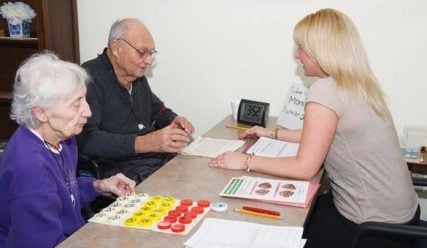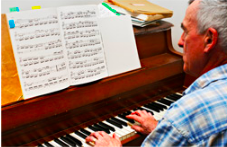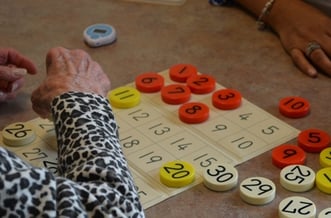Dementia is typically a progressive condition. It can come on slowly, only accelerating in the late stages of disease. When senior parents or grandparents are first diagnosed with Alzheimer's disease or age-associated dementia, they’re usually still lucid to a degree.
They may be a little more forgetful, have a little bit of trouble concentrating, or be just a tad uncoordinated, but they’re still the people you’ve always known and loved. So it’s natural to wonder if there are steps you can take to preserve their remaining function.
In fact, there are some methods for doing so. The SAIDO Learning® system, for example, may help to arrest dementia’s progression, or at least slow it down. Lifelong learning may help to stave off Alzheimer’s development.
And other therapies that engage the brain in novel ways may help. Music and art therapy have both shown promise as memory care measures.
 (Deupree Cottages rolled out SAIDO last year)
(Deupree Cottages rolled out SAIDO last year)
Music Therapy
Certain songs remind you of specific times you heard them, don't they?
The Eagles’ “Hotel California” may remind you of a summer night at the ice cream stand, because it was playing on the radio one time when you and your family went out for sundaes. The theme to Star Wars might remind you of your first date, when your high school boyfriend took you to see that movie.
Those memories are triggered because some sensory information, including hearing, is processed in the temporal lobe of the brain — the same region of the brain responsible for long-term memory.
Music therapy programs are developed with that in mind. Most involve either playing music for seniors in conversational settings, or teaching seniors to sing or pl ay musical instruments in a relaxed setting.
ay musical instruments in a relaxed setting.
The thought is that stimulation of the temporal lobe through music also stimulates memory function. Music, in this way, can be a powerful memory care tool. In a sense, music may help a person to "code” sensory information into memories, and help them later to “decode” that same information, by activating memories.
It can also be soothing.
Seniors with dementia often exhibit anxiety, which can lead to outbursts and aggressive behaviors. Music therapy has been shown to help reduce outbursts and ease behavioral issues. Music therapy is even used in some settings to try to stabilize or improve dementia patients’ motor function.
Try music therapy on your own
When you visit your senior loved one, choose a quiet room and softly play songs that your he or she enjoyed earlier in life. If your father, for example, enjoyed Sinatra songs, you might try streaming Ol’ Blue Eyes on your smartphone during your visit.
Putting daily reminders to music can also help your older parent or grandparent to retain information. You might try composing a short, rhyming poem that contains reminders or instructions, paced to a popular tune that he or she enjoyed earlier in life.
Art therapy may provide an outlet for self-expression that many Alzheimer's patients would otherwise lack.
So let’s suppose your mom has mild, dementia-associated memory loss, and also needs to take a blood pressure medicine every day at a certain time. You know that she was a Glenn Miller fan as a teenager, so you might adapt "Pennsylvania 6-5000" to "Hypertension pills at 7!"
Sing it with her; she'll enjoy reminiscing with you about music she loved, and tapping into that long-term memory of Glenn Miller’s hit may help her to remember to take her medication when she needs to.
Get creative with art therapy
The brain’s temporal lobe doesn't just process hearing — it processes visual information, too. Some senior care experts believe that art therapy may aid in memory care the same way music therapy can.
At our Deupree House and Marjorie P. Lee retirement communities in Cincinnati, for example, volunteer artists come in several times monthly to help our senior residents create, learn and socialize with one another. Both communities have art studio rooms where sessions can be held for small groups.
When artists compose, they translate their perceptions of the world — all the thoughts and emotions that inform those perceptions — into visual expressions. A painter doesn’t just paint a flower on a table; she paints the flower as she feels about it.
Art therapy may provide an outlet for self-expression that many Alzheimer's patients would otherwise lack. Though it may be hard for your loved one to call forward words that express how he or she feels, painting or sculpting might be successful methods for communicating those feelings.
Some retirement communities and adult day programs include painting, crafting and other artmaking in their enrichment efforts — both as entertainment and as memory care tools. Usually, senior participants in art therapy sessions are grouped or paired with artists who can help guide their creative process.
Usually, conversation is fostered and encouraged during the art therapy session, so that visual expressions and memories can be linked in the memory care recipient’s consciousness.
Could a move to a retirement community with music and art therapy programs help your loved one?
If your older parent or grandparent is living in Cincinnati with Alzheimer’s or other age-related dementia, a music or art therapy program may help him or her to preserve memory and function.
Deupree Cottages, for example, has a dedicated memory care unit. SAIDO Learning®, music therapy and art therapy are all used to help residents there to keep living well into the future.
Would a move to a continuing care retirement community be right for your senior loved one who has Alzheimer’s or dementia? Come in and take a tour. Let’s find out how we can help.













